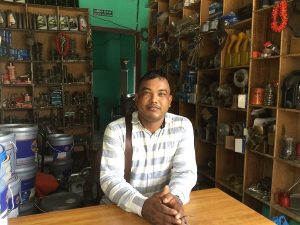
KATHMANDU, Nepal (CIMMYT) – In 2015 Chullu Ram Chaudhary started Dahit Traders, which sells small-scale agricultural machinery in the Bardiya district of mid-western Nepal.
Dahit provides year-round employment to 20 local youths as mechanics and machine operators, and hires an additional 35 mechanics during rice and wheat planting and harvesting seasons. Chaudhary was motivated to found his company in 2014 while attending a machinery training organized by the Cereal Systems Initiative for South Asia (CSISA).
Chaudhary began by focusing on two-wheel tractors and has since expanded his business to several nearby towns, now also providing machine repair services to surrounding districts. His core business has broadened to include a variety of attachments for power tillers, including seed drills, reapers and threshers, all of which are relevant and useful for small-scale farmers of Bardiya and surrounding districts.
Each expansion allows him to provide employment for local youth by creating sales, mechanic and support staff jobs, which has the added benefit of slowing migration from Nepal’s key agricultural production areas. About 1,500 Nepalese youth migrate for foreign employment daily due a lack of employment opportunity and capital constraints in their own communities, a phenomena that directly contributes to agricultural yield loss in Nepal, according to the Food and Agriculture Organization of the United Nations.
This absence of farm labor along with a lack of agricultural knowledge, irrigation and mechanization along with the inability to invest in new technology due to lack of capital also limits Nepal’s yield potential, despite having fertile soil and access to year-round farming. Many plots in Nepal are also very small, due to the traditional inheritance practice of splitting land between sons, further limiting production. Cereal and pulse yields are well below regional averages and present rates of increase won’t meet the long-term requirements.
Success for entrepreneurs like Chaudhary allows farming households to access innovative, scale-appropriate technology, increase employment for youth and boost cropping system productivity, all of which are needed to sufficiently and sustainably increase food production for future generations. In addition to providing training on machinery, CSISA linked Chaudhary with SKT Traders – a national-level importer of small-scale machinery – and provided technical support to Dahit Trader’s mechanics on machinery operation, repair and maintenance.
To increase awareness of scale-appropriate machinery, CSISA and Dahit Traders conducted joint demonstrations of equipment in farmers’ fields in order to help farmers see the potential for these machines to reduce drudgery, increase efficiency and enable them to establish micro enterprises based on custom-hired services.
The Cereal Systems Initiative for South Asia project is led by the International Maize and Wheat Improvement Center with partners the International Rice Research Institute and the International Food Policy Research Institute and funded by the U.S. Agency for International Development and the Bill & Melinda Gates Foundation.
 Capacity development
Capacity development